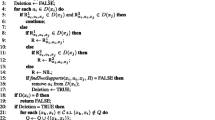Abstract
The lexicographically-ordered CSP (“lexicographic CSP” or “LO-CSP” for short) combines a simple representation of preferences with the feasibility constraints of ordinary CSPs. Preferences are defined by a total ordering across all assignments, such that a change in assignment to a given variable is more important than any change in assignment to any less important variable. In this paper, we show how this representation can be extended to handle conditional preferences in two ways. In the first, for each conditional preference relation, the parents have higher priority than the children in the original lexicographic ordering. In the second, the relation between parents and children need not correspond to the importance ordering of variables. In this case, by obviating the “overwhelming advantage” effect with respect to the original variables and values, the representational capacity is significantly enhanced. For problems of the first type, any of the algorithms originally devised for ordinary LO-CSPs can also be used when some of the domain orderings are dependent on assignments to “parent” variables. For problems of the second type, algorithms based on lexical orders can be used if the representation is augmented by variables and constraints that link preference orders to assignments. In addition, the branch-and-bound algorithm originally devised for ordinary LO-CSPs can be extended to handle CSPs with conditional domain orderings.
Similar content being viewed by others
References
Boutilier, C., Brafman, R. I., Hoos, H. H., & Poole, D. (1999). Reasoning with conditional ceteris paribus preference statements. In Proc. fifteenth annual conf. on uncertainty in artif. intell. (pp. 71–80).
Boutilier, C., Brafman, R. I., Domshlak, C., Hoos, H., & Poole, D. (2004a). Preference-based constrained optimization with CP-nets. Computational Intelligence, 20(2), 137–157.
Boutilier, C., Brafman, R. I., Domshlak, C., Hoos, H. H., & Poole, D. (2004b). CP-nets: A tool for representing and reasoning with conditional ceteris paribus preference statements. Journal of Artificial Intelligence Research, 21, 135–191.
Boutilier, C., Domshlak, C., & Shimony, E. (2006). On graphical modeling of preference and importance. Journal of Artificial Intelligence Research, 25, 389–424.
Brafman, R. I., & Domshlak, C. (2002). Introducing variable importance tradeoffs into CP-nets. In Proc. eighteenth annual conf. on uncertainty in artif. intell. (pp. 69–76).
Domshlak, C., & Brafman, R. I. (2002). CP-nets—reasoning and consistency testing. In Proc. eighth conf. on principles of knowledge representation and reasoning (pp. 121–132).
Fishburn, P. (1974). Lexicographic orders, utilities and decision rules: A survey. Management Science, 20(11), 1442–1471.
Freuder, E. C., Wallace, R. J., & Heffernan, R. (2003). Ordinal constraint satisfaction. In Fifth internat. workshop on soft constraints—SOFT’02.
Freuder, E. C., Heffernan, R., Wallace, R. J., & Wilson, N. (2007). Lexicographically-ordered constraint satisfaction problems (submitted).
Goldsmith, J., Lang, J., Truszczynski, M., & Wilson, N. (2005). The computational complexity of dominance and consistency in CP-nets. In Proc. nineteenth internat. joint conf. on artif. intell. (pp. 144–149).
Junker, U. (2002). Preference-based search and multi-criteria optimization. In Proc. eighteenth nat. conf. on artif. intell. (pp. 34–40).
Keeney, R. L., & Raiffa, H. (1993). Decisions with multiple objectives. Preferences and value tradeoffs. Cambridge: Cambridge University Press.
Schiex, T., Fargier, H., & Verfaillie, G. (1995). Valued constraint satisfaction problems: Hard and easy problems. In Proc. fourteenth internat. joint conf. on artif. intell. (pp. 631–637).
Wallace, R. J. (2006). Interpretation of preferences based on extended conditional lexicographic orders. In U. Junker, W. Kiessling (Eds.), ECAI 2006 multidisciplinary workshop on advances in preference handling (pp. 141–147).
Wallace, R. J., & Wilson, N. (2006). Conditional lexicographic orders in constraint satisfaction problems. In J. C. Beck & B. M. Smith (Eds.), Lecture notes in computer science : Vol. 3990. Proc. third internat. conf. on integration of AI and OR techniques in constraint programming (pp. 258–272). Berlin: Springer.
Wellman, M. P., & Doyle, J. (1991). Preferential semantics for goals. In Proc. ninth nat. conf. on artif. intell. (pp. 698–703).
Wilson, N. (2004a). Extending CP-nets with stronger conditional preference statements. In Proc. nineteenth nat. conf. on artif. intell. (pp. 735–741).
Wilson, N. (2004b). Consistency and constrained optimisation for conditional preferences. In Proc. sixteenth Europ. conf. on artif. intell. (pp. 888–892).
Wilson, N. (2006). An efficient upper approximation for conditional preference. In Proc. seventeenth Europ. conf. on artif. intell. (pp. 472–476).
Author information
Authors and Affiliations
Corresponding author
Rights and permissions
About this article
Cite this article
Wallace, R.J., Wilson, N. Conditional lexicographic orders in constraint satisfaction problems. Ann Oper Res 171, 3–25 (2009). https://doi.org/10.1007/s10479-008-0385-3
Published:
Issue Date:
DOI: https://doi.org/10.1007/s10479-008-0385-3




